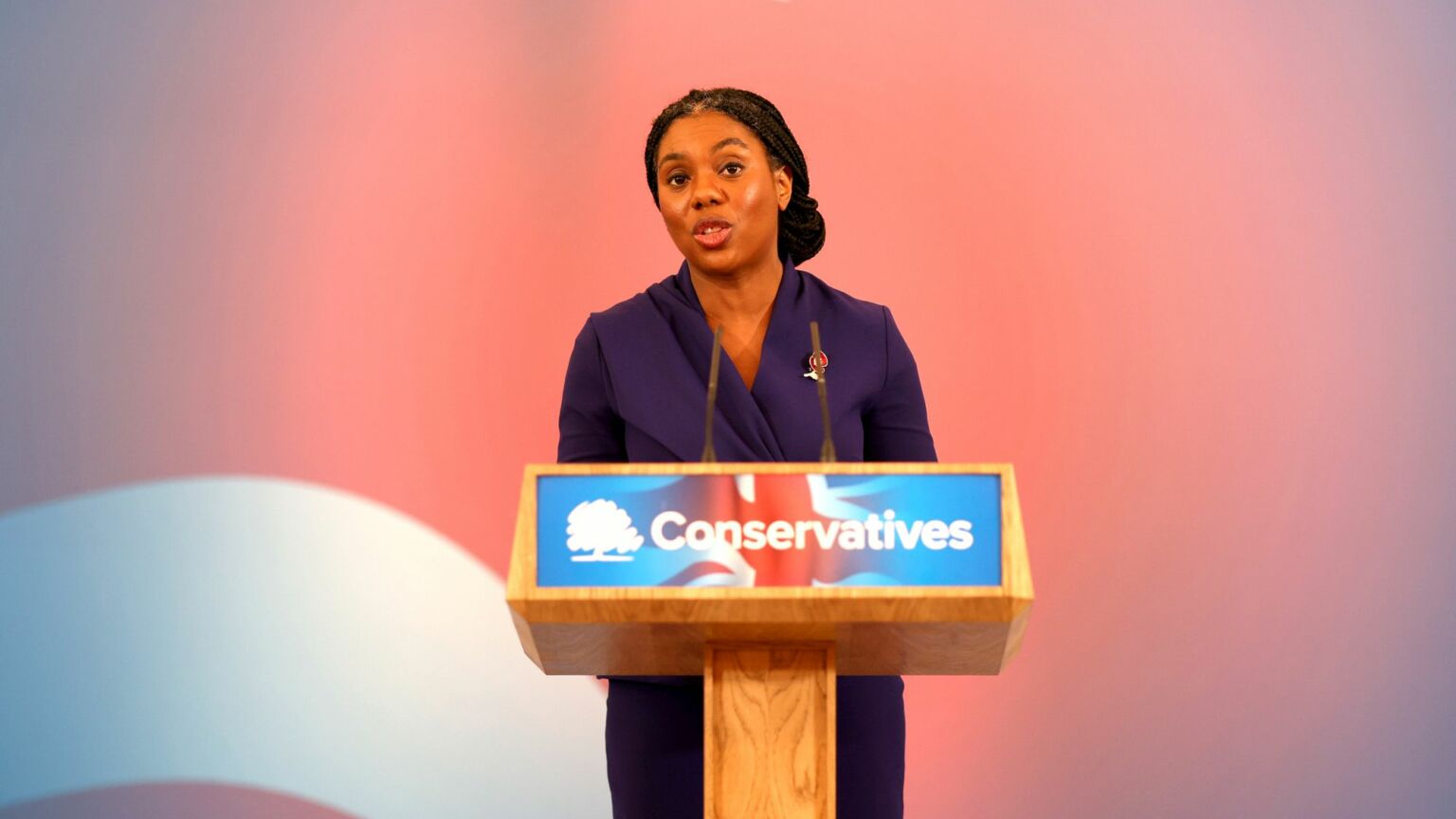Why Kemi Badenoch’s rise riles the identitarian left
So-called progressives have branded the new Tory leader 'the black face of white supremacy’.

Want to read spiked ad-free? Become a spiked supporter.
The reaction from so-called anti-racists to Kemi Badenoch’s election as leader of the Conservative Party has been predictably nasty.
The fact that a major British political party now has its first black leader clearly shows the progress we as a society have made on race relations. Yet far too many on the ‘progressive’ left are determined not to see it that way. Take the race-baiting Dr Shola Mos-Shogbamimu. On an episode of the Make It Plain podcast, recorded in October, she called Badenoch ‘the black face of white supremacy’ and a ‘racial gatekeeper’. The clip did the rounds again over the weekend.
The response to Badenoch’s victory on Saturday has been similarly hysterical. Kehinde Andrews, a leading identitarian and professor of black studies at Birmingham City University, has called Badenoch ‘the shining ebony example that the psychosis of whiteness is not reserved for those with white skin’. Writer Nels Abbey claims that Badenoch’s ascent to Tory leader was ‘conclusive proof’ of ‘how powerful and how far anti-blackness will get you in Britain’. Labour MP Dawn Butler eagerly shared a post by Abbey in which he described Badenoch as ‘the most prominent member of white supremacy’s black-collaborator class’. After her post generated negative headlines, she quickly deleted it.
Judging by their frothing response, Britain’s identitarian grievance-mongers are clearly miffed by Badenoch’s ascent to the top of Britain’s main right-wing political party. After all, they spend much of their time talking up just how deeply and systematically racist Britain is. And yet, in Badenoch’s rise, we have further proof that, contrary to the identitarian fear-mongering, Britain is one of the fairest and most tolerant places on Earth. A place, that is, where racial and ethnic minorities can succeed at the highest levels of politics.
What’s more, Badenoch herself refuses to toe the identitarian line. She rejects the dystopian portraits that are painted by activists about Britain’s supposed racism. Instead, as she demonstrated as the UK’s equalities minister, she holds an overwhelmingly positive view of the considerable opportunities, rights, freedoms and protections the UK offers its citizens, regardless of their race. Her view is shaped, in part, by her experience living in her country of origin, Nigeria, which remains relatively unstable and continues to experience serious levels of institutional corruption.
Badenoch represents a formidable challenge to the likes of Andrews, Mos-Shogbamimu, Abbey and Butler – all fully fledged members of Britain’s identitarian-grievance industry. Instead of blaming racism for Britain’s shortcomings, she talks of the importance of a stable family unit, of having a dedicated work ethic, of adopting a positive approach to integration and of taking responsibility for one’s own shortcomings. Her hopeful conservatism poses a direct threat to the doom-and-gloom racial narratives peddled by the left.
Of course, it’s not just woke leftists playing the identity-politics game. Too many on the right are also at it. Former Tory foreign secretary James Cleverly used the occasion of Badenoch’s victory to call Labour ‘male, pale and stale’. There is no shortage of problems with this Labour government, but the sex and skin colour of its leading figures should not be counted among them.
The same goes for some of Badenoch’s champions, by the way. To suggest that her elevation alone is a blow for progress on racial issues is to mirror the identitarians’ game. One can only hope that the political and media discussion moves beyond Badenoch’s racial identity. We need to learn more about what she actually intends to do on the ‘equalities’ front, as well as Britain’s ongoing cost-of-living crisis, lengthy NHS waiting lists, high levels of immigration dependency, dysfunctional asylum policies and rising crime.
One can appreciate the historic significance of Britain having its first black leader in Westminster. But as Badenoch herself has repeatedly said, the focus should be on her views and vision for the country, not on her race. We should all follow her lead.
Rakib Ehsan is the author of Beyond Grievance: What the Left Gets Wrong about Ethnic Minorities, which is available to order on Amazon.
Picture by: Getty.
Who funds spiked? You do
We are funded by you. And in this era of cancel culture and advertiser boycotts, we rely on your donations more than ever. Seventy per cent of our revenue comes from our readers’ donations – the vast majority giving just £5 per month. If you make a regular donation – of £5 a month or £50 a year – you can become a and enjoy:
–Ad-free reading
–Exclusive events
–Access to our comments section
It’s the best way to keep spiked going – and growing. Thank you!









Comments
Want to join the conversation?
Only spiked supporters and patrons, who donate regularly to us, can comment on our articles.